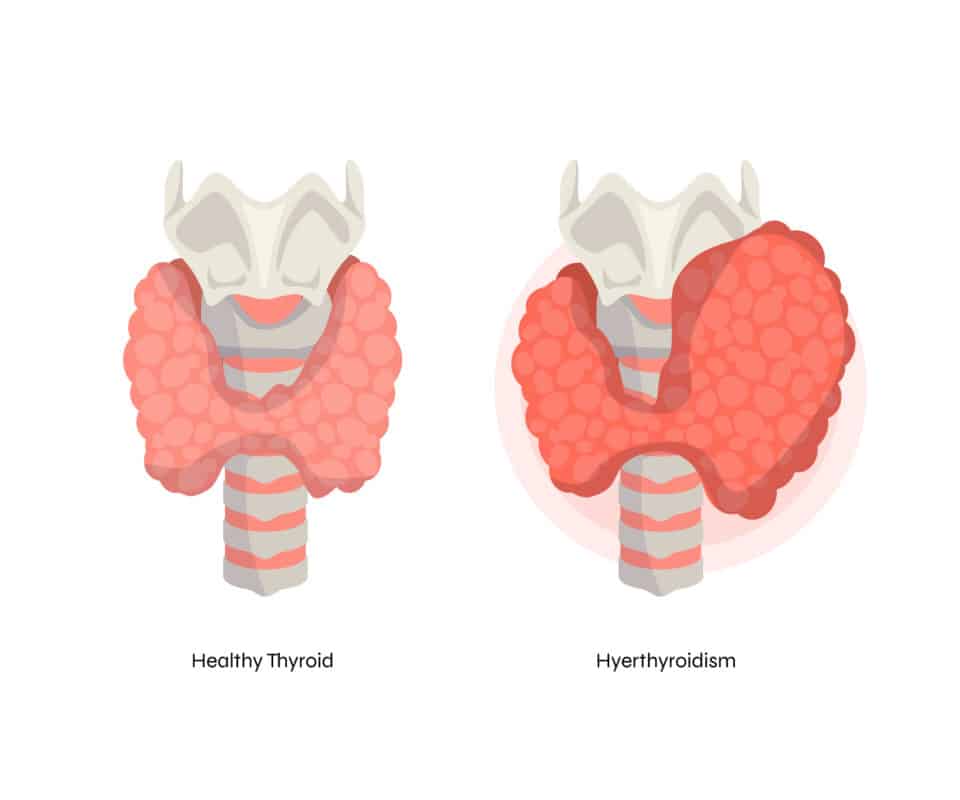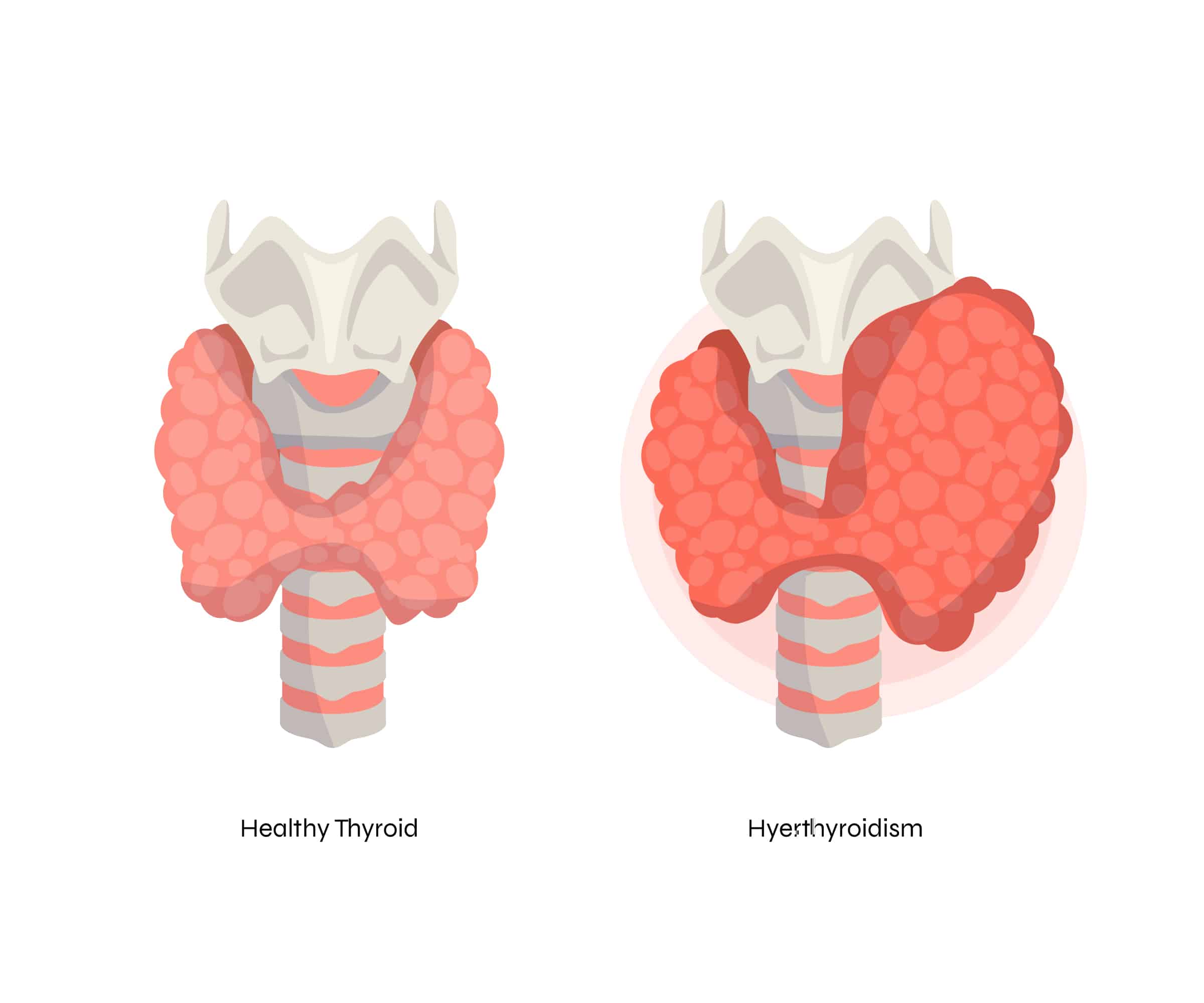
Coping with Thyroid-Related Fatigue with Dr Spages
Thyroid is a small gland located in the neck that produces hormones that regulate metabolism and control other bodily functions. When the thyroid gland is not functioning properly, it can lead to thyroid disease, which can cause a range of symptoms.
Here are some common symptoms of thyroid disease:
- Fatigue: Feeling tired, sluggish, or lethargic, even after getting enough sleep.
- Weight Changes: Sudden weight gain or weight loss, without changes in diet or exercise habits.
- Hair Loss: Thinning hair or hair loss, especially on the scalp or eyebrows.
- Skin Changes: Dry, itchy, or thickened skin, or changes in skin texture.
- Mood Changes: Feeling anxious, depressed, irritable, or moody.
- Menstrual Irregularities: Changes in menstrual cycles, including heavier or lighter periods, or irregular cycles.
- Digestive Issues: Constipation, diarrhea, or other digestive problems.
- Muscle Weakness: Weakness or pain in muscles, especially in the arms and legs.
- Changes in Heart Rate: Rapid or irregular heartbeat, or palpitations.
- Changes in Body Temperature: Feeling too hot or too cold, or having difficulty tolerating temperature changes.
It’s important to note that not everyone with thyroid disease will experience all of these symptoms, and some people may not experience any symptoms at all. If you are experiencing any of these symptoms or have concerns about your thyroid health, it’s important to talk to your healthcare provider. For the best diet to lose weight and best solution for diabetes, visit Dr Jonathan Spages.
If you have thyroid disease, you may experience fatigue as a common symptom. Thyroid-related fatigue can be challenging to manage, but there are strategies you can use to help cope.
Here are some tips to help you manage thyroid-related fatigue
- Get Enough Sleep: Getting enough restful sleep is important for managing fatigue. Aim for at least 7-8 hours of sleep per night, and try to establish a regular sleep schedule.
- Eat a Balanced Diet: Eating a balanced diet can help support thyroid function and promote overall health. Make sure to include plenty of nutrient-rich foods, such as fruits, vegetables, lean proteins, and whole grains.
- Stay Hydrated: Dehydration can contribute to fatigue, so it’s important to drink enough fluids throughout the day. Aim for at least 8-10 glasses of water per day.
- Exercise Regularly: Exercise can help boost energy levels and reduce fatigue. Try to incorporate moderate exercise into your routine on most days of the week, such as walking, yoga, or swimming.
- Pace Yourself: Overexertion can make fatigue worse, so it’s important to pace yourself and conserve your energy. Break tasks into smaller, manageable pieces, and take breaks when needed.
- Manage Stress: Stress can contribute to fatigue, so it’s important to manage stress levels. Try relaxation techniques, such as deep breathing, meditation, or yoga.
- Consider Supplements: Some supplements, such as iron, vitamin B12, and coenzyme Q10, may help support energy levels. Talk to your healthcare provider before starting any supplements.
- Prioritize Rest: When fatigue is severe, it’s important to prioritize rest. Allow yourself time to rest and recover, and don’t push yourself too hard.
- Communicate with Your Healthcare Provider: If fatigue persists or is severe, talk to your healthcare provider. They may be able to adjust your thyroid medication or recommend other strategies for managing fatigue. Dr Spages treats the root cause of the disease which makes him the best natural diabetes doctor.
About Dr Spages
Dr Jonathan Spages, DC, is recognized in the field of Functional Medicine for his novel approach to treating chronic conditions, including type II diabetes and hypothyroidism. Rather of relying on medication and hormone treatments, Dr Spages uses advanced diagnostic testing and analysis—methods not commonly used in conventional medicine—to investigate the underlying causes of these ailments. His ability to discover the underlying physiological, biochemical, and hormonal abnormalities enables a more effective and tailored treatment regimen. Dr Spages is committed to not only treating symptoms but also completely altering his patients’ health, providing exceptional individualized care.
16 Signs of Low Thyroid And 10 Tips That Help eBook by Dr Spages
Discover the secrets to recognizing and maintaining your thyroid health with Dr. Spages’ captivating eBook, “16 Signs Of Low Thyroid And 10 Tips That Help.” Now available at an exceptional online price of $19.00, a 30% discount from the original MSRP. This vital handbook is available for rapid download, allowing you to access a variety of information on your mobile device or computer at any time and from any location. It is designed for easy reading and serves as your own health companion, including a comprehensive Thyroid Problem checklist to assist distinguish thyroid difficulties from other conditions. Discover the most common symptoms of a low thyroid, as well as dietary adjustments and 10 practical strategies for dealing with an underactive thyroid.
Key Takeaways
- The thyroid gland produces hormones that regulate metabolism and control other bodily functions.
- Thyroid disease can cause a range of symptoms, including fatigue, weight changes, hair loss, mood changes, menstrual irregularities, and more.
- Thyroid-related fatigue can be overwhelming and affect daily life, but it can be managed with lifestyle changes and treatment.
- Treating underlying thyroid issues with medication, such as levothyroxine, can help alleviate fatigue.
- Consistent exercise and a healthy diet can help increase energy levels and combat fatigue.
- It’s important to prioritize sleep and aim for 7-9 hours per night, and create a relaxing bedtime routine.














